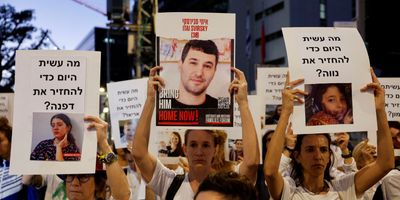Well, we were told to ignore all rumors about a hostage release deal until something was announced officially, so we did.
But now it’s for real: Late Wednesday, Israel’s cabinet approved a limited cease-fire with Hamas militants in the Gaza Strip in exchange for the release of some of the roughly 240 hostages that Hamas abducted during its Oct. 7 rampage through southern Israel. The deal was brokered with help from the US and Qatar.
The terms: Israel will suspend its assault on Gaza for a period of four days, during which time Hamas will release 50 of the hostages, and Israel will release 150 of the nearly 8,000 Palestinians currently jailed in Israel.
Israel will not withdraw any of its forces from Gaza during that time.
Around 300 humanitarian aid trucks will be allowed into the Gaza Strip for each day of the cease-fire.
Israel may prolong the cease-fire by one day for every additional 10 hostages released by Hamas.
Prime Minister Benjamin Netanyahu pledged to continue Israel’s military action in Gaza after the cease-fire is over.
The pressure: The Israeli government has sworn to destroy Hamas in retaliation for the Oct. 7 attacks, but it has also come under intense pressure at home to secure the release of the hostages.
International demands for a cease-fire, meanwhile, have grown as well. The death toll from Israel’s assault on Gaza has now surpassed 12,000 people, according to local health authorities, while more than two-thirds of Gaza’s 2.2 million population have been displaced. Israeli blockades of humanitarian aid and fuel have exacerbated a gruesome humanitarian crisis in the densely packed enclave.
The catch: It’s not clear when the cease-fire will go into effect. Thursday would be the earliest, as Israel must leave time for any local court challenges to the release of specific Palestinian prisoners, whose names will be made public on Wednesday.
The concern: Agreeing to a cease-fire and hostage release is a major breakthrough, but it’s only a beginning. There is little trust between Hamas and Israel, and both sides will need to maintain strict control over their forces to observe the cease-fire. Even the slightest of perceived provocations could spiral into fresh violence that wrecks the deal entirely.
